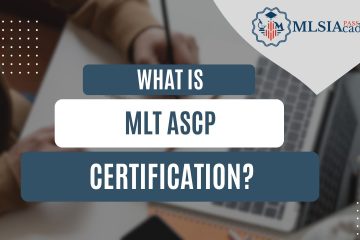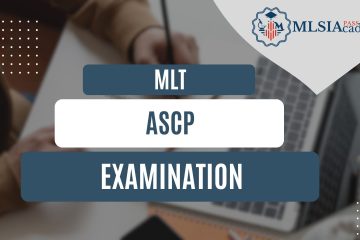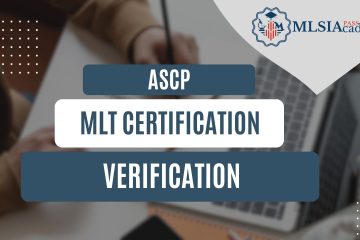MLT ASCP Guidelines: What is the Exam Syllabus?
Do you want to know MLT ASCP guidelines?
To pass the ASCP medical lab technician exam, you have to have enough experience in all the indicated areas, procedures, and tests.
This article offers you complete information about the MLT ASCP guidelines, area of experience and extent of experience.
MLT ASCP Content Guidelines: For MLT ASCP/ASCPi
The ASCP Board of Certification offers complete information for the ASCP medical lab technician exam syllabus.
The following table shows the complete information about the exam content areas, main topics, and question percentages:
| Content Area | Description | Question Percentage |
| Blood Banking | Blood product, transfusion practice, blood group system, molecular testing, physiology, serologic testing, pathophysiology, and, blood group immunology | 15-20 |
| Microbiology | Postanalytic process, analytic process for mycology, virology, mycobacteriology, parasitology; analytical techniques for mycobacteriology, and preanalytical procedures | 15-20 |
| Chemistry | Toxicology, vitamins, electrolytes, heme derivatives, enzymes, therapeutic drug monitoring, endocrinology, protein with other nitrogen-containing elements, carbohydrates, electrolytes, acid-base determination, and lipids | 20-25 |
| Urinalysis and Other Body Fluids | Disease conditions, microscopic analysis, chemical testing, physiology, physical testing | 5-10 |
| Lab Operation | Quality assurance, instrumentation, lab mathematics, automated methods, safety, manual process | 5-10 |
| Immunology | Test results, serologic methodology, immune system illness, immunology rules, infectious disease serology, transplantation | 5-10 |
| Hematology | Physiology, lab experiments, disease conditions, hemostasis ( lab determination, disease states, & physiology) | 20-25 |
MLT ASCP Guidelines: An Ultimate Information
The following is the experience in all subjects that you must get if you are meeting the requirements of route 4 (U.S. candidates);
Blood Banking MLT ASCP Guidelines
- Laboratory safety
- Quality assurance
- Quality control
- Troubleshooting and lab device maintenance
- HDFN testing
- Administration and processing of blood materials
- Reaction testing for transfusion adverse
- Antiglobuline test (direct)
- Testing for compatibility
- Identification and detection of antibody
- Blood group system types, including RH, and ABO.
- Processing, evaluation, and collection of sample
Chemistry MLT ASCP Guidelines
- Evaluation, gathering, and processing of specimens
- Basic analytical techniques including, protein, lipids, enzymes, bilirubin, creatinine, blood urea nitrogen, glucose, blood gases, and electrolytes.
- Tumor markers and endocrinology
- Immunoassays
- Toxicology or therapeutic drug monitoring
- Maintenance of instruments & troubleshooting
- Lab safety
- Quality control or assurance
Hematology MLT ASCP Guidelines
- Sample collection, processing, and evaluation
- Blood smear evaluation, preparation, and differential
- Blood count (complete)
- Tests of miscellaneous ( sickle screen, ESR, reticulocyte, etc.)
- Coagulation tests (routine) (D-dimer, APTT, PT, etc)
- Lab safety
- Assurance/quality control
- Troubleshooting and preventive maintenance of instruments
Immunology MLT ASCP Guidelines
- Sample gathering, procedureing, and evaluation
- Automated or manual serological tests (heterophile antibody, rheumatoid arthritis, syphilis, rubella, hepatitis, etc.)
- Laboratory safety
- Quality assurance and quality control
- Maintenance and prevention of instruments and troubleshooting
Microbiology MLT (ASCP) Guidelines
- Safety of laboratory
- Quality control
- Quality assurance
- Troubleshooting and maintenance of instruments
- Molecular or/and automated, manual methods for identification and detection of microorganisms
- Media selection
- Culture evaluation
- Testing for antibiotic susceptibility
- Sample gathering, processing, and evaluation
ASCP MLT Guidelines for Urine and Other Body Fluids
- Lab safety
- Processing, evaluation, and gathering of sample
- Routine urinalysis
- Other body fluids routine evaluation
- Quality control
- Troubleshooting
MLT ASCPi Guidelines: How it Different from MLT ASCP
If you are an international applicant and are satisfied with route 3 requirements, you have to meet some experience requirements also.
- Blood banking (same as MLT ASCP)
- Chemistry (same as ASCP MLT)
- Microbiology (same as MLT ASCP)
- Hematology (same as MLT ASCP).

Abdelhalim Elshawadfy is an ASCP certified Medical Laboratory Scientist (MLS ASCP), Specialist in Microbiology (SM ASCP), and Molecular Biology Technologist (MB ASCP) with a distinguished career marked by expertise, continuous learning, and a commitment to elevating the standards of clinical laboratory science. As an ASCP Certification Expert and American Board Certification Expert, Abdelhalim Elshawadfy continues to make invaluable contributions to the field, leaving a lasting impact on the medical community.



